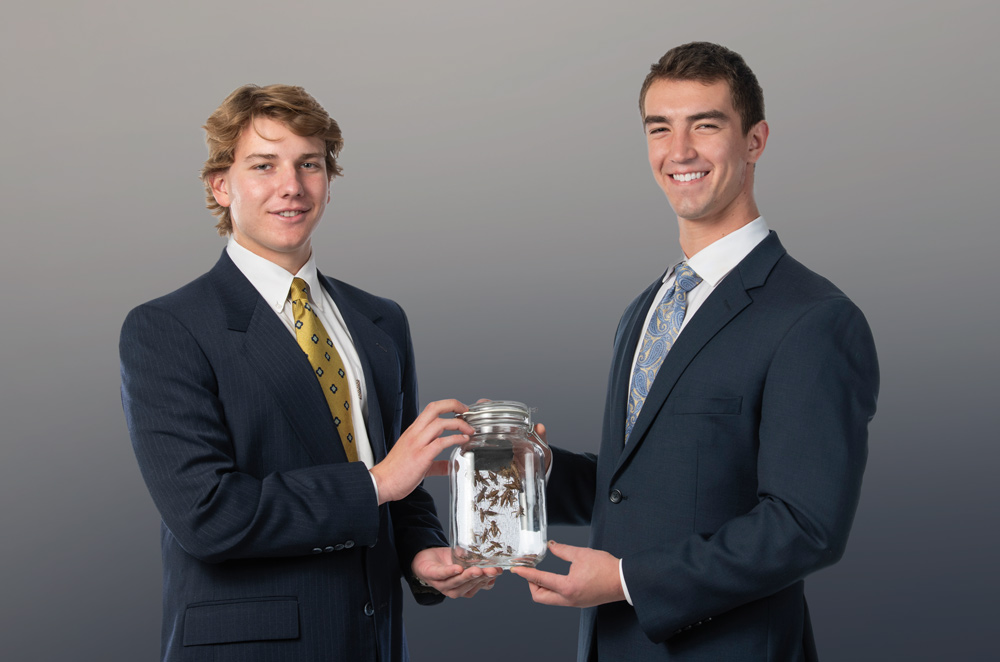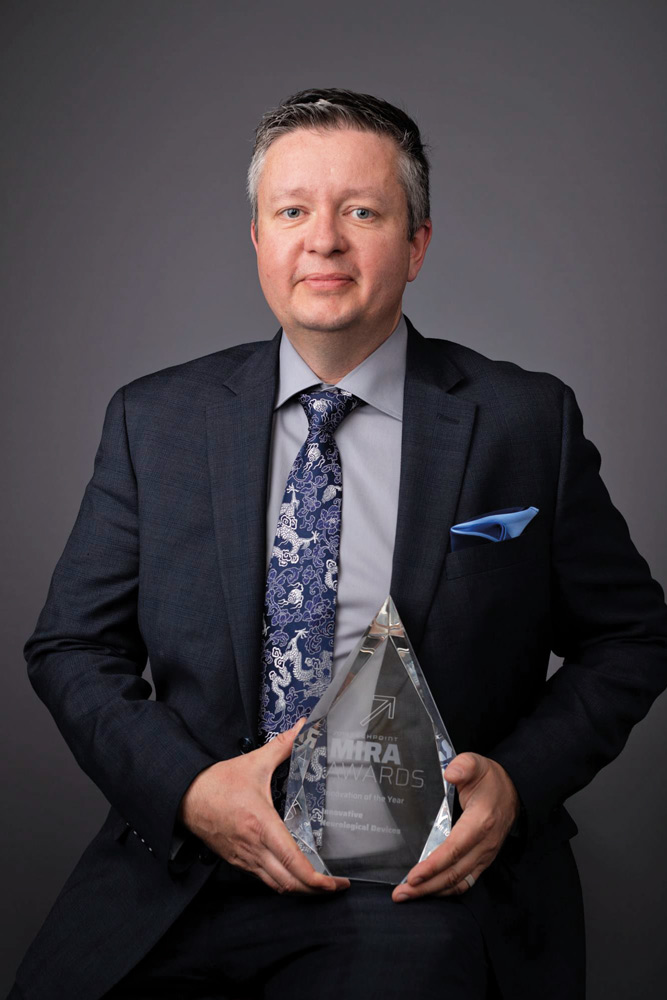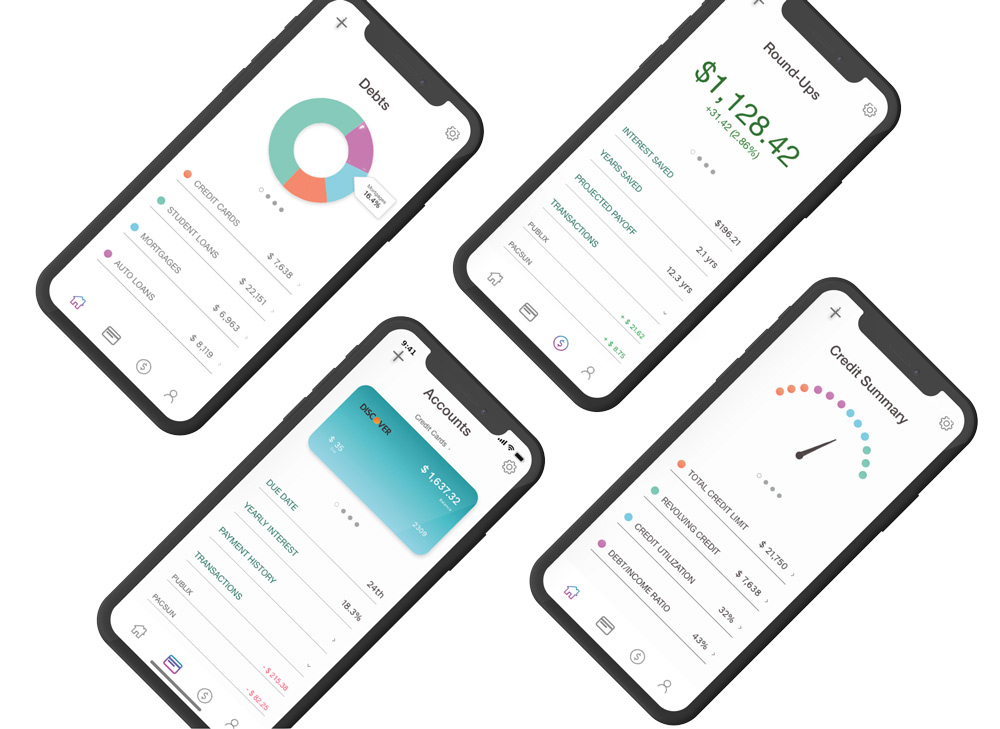INNOVATION SHOWCASE
By | Spring 2020
A STARTUP IS BORN
ENTREPRENEURIAL INSPIRATION COMES TO THOSE WHO PROBLEM SOLVE.
“THE PRIMARY FUNCTION OF COMMERCE IS SERVICE TO MANKIND.”
Notre Dame’s founding business school dean John Cardinal O’Hara, C.S.C.
A family member’s struggle with anxiety. A former high school athlete’s search for answers to her health and wellness challenges. An unexpected question posed in a college class.
Sure, you could stare at a blank page and wait for entrepreneurial inspiration to strike. But the muse that moves new ventures into the marketplace appears more often to those who ideate on the problems people encounter any given day. Just ask Bart Waclawik (MBA ’04), Lindsey Brassington (MBA ’09), Jimmy Suszka (BBA ’20) and Daniel Jimenez (BBA ’20). They’re all in different phases of launching startups that address some of the challenges they, and others, have encountered.
Banner Photo: What’s bugging you? The answer to this question might just spark a new venture. It did for finance major Jimmy Suszka and his friend James Philhower (ND ’20), who recognized inefficiencies in cricket farming as they researched how many of the insects it takes to meet the daily human recommended protein requirement. “Over a billion people in the world regularly eat insects, so the number of people are there,” Jimmy says. They founded a cricket farming venture last fall using a more efficient farming method they developed. (Photo by Barbara Johnston)
1. ACCESS LOW COST LLC
Jimmy Suszka (BBA ’20) was never a big fan of bugs. And yet he and computer science major James Philhower (ND ’20), welcomed 80,000 crickets to their lives in September as part of their cricket farm venture. A question asked in his process analytics class planted the idea in Suszka’s head: “How many crickets a day does it take to meet the human recommended protein requirement?”
His hunt for an answer prompted him to ask a more interesting question: Is there a more efficient way to farm the protein-rich insects (which, by the way, are about 60% protein by weight whereas chicken is about 30%)? He and Philhower recognized that improving the design of cricket farms would lower the production cost. They signed on as a certified supplier for Cowboy Crickets in Montana and incorporated their business, Access Low Cost LLC. “That name originates from our idea of trying to make crickets as low cost as possible,” Suszka says.Their innovative farm design enables them to care for their crickets in about 15 minutes a day in a space they rented in downtown South Bend.

 2. CERVELLA
2. CERVELLA
A family member’s struggle with the side effects of first-line drug treatments for an anxiety disorder prompted Bart Waclawik (MBA ’04) to seek other options. His family member found relief from cranial electrotherapy stimulation, an FDA-approved therapy that delivers low intensity microcurrents to the brain.
While it might sound like science fiction, the technology has been around since the late 1970s and is available for at-home use with a prescription. However, Waclawik says, the tech was cumbersome and his family member refused to use it outside of the house to manage anxiety attacks. To overcome this barrier, Waclawik, who had worked at a medical equipment startup in the past, spent two years developing a way to incorporate the device into something more unobtrusive: a pair of wireless over-the-ear headphones. It worked, and his new startup, Cervella, won a 2019 TechPoint MIRA Innovation of the Year Award. “Nobody needs to know that you’re using it,” he says. “People just think you’re listening to music. In reality, you’re getting medical treatment.”
3. GENERIS APP
 When Lindsey Brassington (MBA ’09) went looking for answers to her own lifelong health and wellness challenges, she found herself sitting through a variety of tests. A former swim team captain, she was no stranger to disciplined eating and exercise. Yet she found herself chronically tired and battling her weight. When her doctor explained that she had a vitamin deficiency and that, based on certain genetic markers, she would benefit from specific diet changes, she felt relief.
When Lindsey Brassington (MBA ’09) went looking for answers to her own lifelong health and wellness challenges, she found herself sitting through a variety of tests. A former swim team captain, she was no stranger to disciplined eating and exercise. Yet she found herself chronically tired and battling her weight. When her doctor explained that she had a vitamin deficiency and that, based on certain genetic markers, she would benefit from specific diet changes, she felt relief.
“Understanding that my body genetically runs best on a lean protein and fish diet as opposed to another food plan helped shortcut my trial and error,” she says. “I had done trial and error for a long time. What works for a friend, won’t work for me.” And, Brassington realized, if she benefited from knowing what her DNA indicated about her diet and exercise needs, perhaps others could, too. She partnered with biomedical researcher Amy Stark, who serves as director of the DNA Learning Center at Notre Dame, to develop the GENERIS app, which makes personalized food, fitness and supplement recommendations based in part on DNA testing. GENERIS was one of Notre Dame’s IDEA Center’s 2019 startups and launched an early version of its iOS app in October 2019 and is focused on product optimization.
4. DEBTLY
 Daniel Jimenez (BBA ’20), a first-generation college student who grew up in a low-income household, recognizes the challenges that many face when it comes to keeping personal finances on track. He co-founded Debtly, a mobile app designed to guide users toward financial literacy and independence. The app, which is in beta testing, qualified for the IDEA Center’s Race to Revenue and won two awards in the McCloskey New Venture Competition. Through the app, users can pay bills, track expenses and budget. The goal is to help users pay off their debt and establish healthy financial habits. “We want to educate people to a point where they never fall into [serious debt] again,” he says, noting that an estimated 50 million Americans are currently struggling with debt.
Daniel Jimenez (BBA ’20), a first-generation college student who grew up in a low-income household, recognizes the challenges that many face when it comes to keeping personal finances on track. He co-founded Debtly, a mobile app designed to guide users toward financial literacy and independence. The app, which is in beta testing, qualified for the IDEA Center’s Race to Revenue and won two awards in the McCloskey New Venture Competition. Through the app, users can pay bills, track expenses and budget. The goal is to help users pay off their debt and establish healthy financial habits. “We want to educate people to a point where they never fall into [serious debt] again,” he says, noting that an estimated 50 million Americans are currently struggling with debt.
2019 NOTRE DAME STARTUPS
Nine of Notre Dame’s 32 startups from 2019 were founded by Mendoza College of Business students and alumni. To qualify as a Notre Dame startup, the initial business or invention disclosure must undergo a rigorous vetting process with Notre Dame’s IDEA Center.
ADFORCE TECHNOLOGIES
Founder: Jerry Lancaster (BBA ’20)
Adforce allows Uber and Lyft drivers to earn additional income by outfitting their vehicles with a roof-mounted Adforce Mobile Digital Billboard.
AU ATHLETE
Founder: Jonathan Small (BBA ’20)
This sports tech company makes equipment to help athletes train more effectively. Its Halo Hurdle is a magnetized hurdle that comes apart safely on contact to prevent injuries to athletes.
GENERIS
Founder: Lindsey Brassington (MBA ’09)
GENERIS is a personalized wellness platform powered by DNA. Its app offers personalized food,
activity and supplement plans to help users meet their goals.
LENA WORKS
Founder: Bill O’Hayer (BBA ’83)
The Lena System is a remote monitoring and HVAC control system for unoccupied buildings. It can quickly turn any thermostat into a smart thermostat without WiFi.
RCADE
Founder: Austin Paxson (BBA ’20)
Rcade is a social media platform for gamers, designed by gamers. Users are able to upload, edit and share their favorite video game clips.
SPREAD THE SWELL
Founder: Connor Dillon (BBA ’19)
Spread the Swell is a not-for-profit providing surf lessons to inner city, underprivileged youth to detoxify and destress their lives by connecting with nature through the ocean.
TRANSLATING DATA
Founder: Jason Beutler (MBA ’09)
Translating Data uses big data and reporting methods to create and provide business intelligence tools for payers, health systems and community-based organizations.
TRÉSOR BLEU
Founder: Catherine Bennett (MBA ’93)
Trésor Bleu is an online retailer and designer of vintage reproduction devotional medals from France.
UNPLUG
Founder: Jacob Sheehan (MBA/MSBA ’20)
This AI-powered smart plug detects when appliances are consuming standby power and virtually unplugs them in order to halt electricity waste. Its algorithm adapts to users’ day-to-day schedule.

Comments